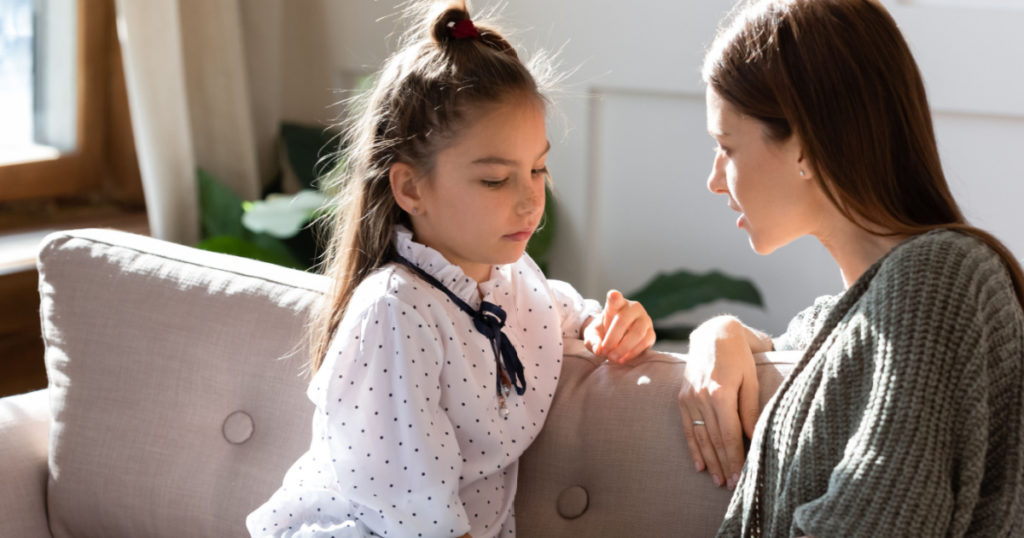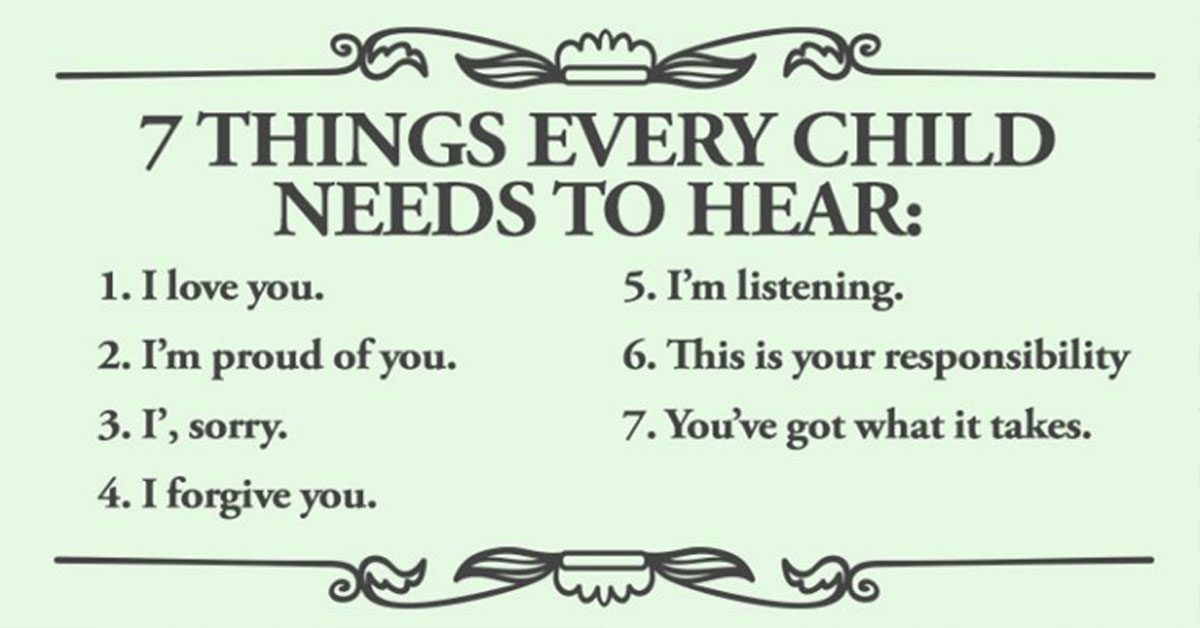As a parent, your child’s psychological and emotional developments are part of your foremost responsibilities. Children are emotionally shaped by the words they hear and the tone in which these words are spoken to them. A lot of parents spend so much time during expectancy worrying about how they’d communicate effectively with their children. When the children finally begin to arrive, it becomes difficult to live up to your plans. No matter how much you love them, having kids is emotionally and physically draining, and you’d often find yourself slipping up with the occasional nagging and forgetting what to say at the right time.
Read: 20 Unexpected Children’s Questions Adults Wouldn’t Even Think About
Imagine if you have voice recorders installed all over your house. Play the recordings

Would you be proud of how you’ve been communicating with your child? Have there been moments when exhaustion or anger got the better of you and you said the wrong thing or used the wrong tone of voice? Parents are only humans. There’ll be lapses in their judgment from time to time. However, it’s never too late to set your methods straight, especially if your child is still at some formative stage, either infancy or adolescence.
Proper communication is invaluable to a child’s all-round development

Several studies have shown that yelling at kids or nagging at them will only make them physically and verbally aggressive. Low self-esteem, insecurity, anxiety, and depression are long-term effects of not using the appropriate language with your children. Many psychologically dysfunctional adults today were probably kids who didn’t experience love, kindness, encouragement, and empathy at home. Children are more emotional than they appear, and at a young age, they are more attuned to creating memories with the most seemingly insignificant experiences.
7 phrases your child should always hear

Many budding athletes and performers who lost the will to build on their talents were discouraged because they always heard, “Second place isn’t good enough,” from parents who thought they were “spurring” the kids on. While there is not one phrase you can utter that will ensure your child’s future, saying some of these could certainly help.
1. I love you

Don’t assume that your children know by natural default that you love him them. You have to say it with genuine emotion, and as often as you can. Say it a billion times before they reach the age of 18, and even then, never stop letting them know. Telling your kids that you love them is a way to let them know that they can trust you. You’re telling them that you have their best interests at heart and that you’ll do everything to keep them safe. They feel special, happy, content and safe knowing that they are loved and cherished. You shouldn’t just say the words. Let them know you mean it. Let your eyes and smile reflect it.
2. I’m proud of you

If you want to raise confident adults, then you must always let your kids know that you are proud of their big wins and little successes. They have to know that you are impressed with their progress if they are going to keep doing well or getting better. Dancing, singing, swimming, football, drawing, math – whatever they decide to do at any point in time, always let them know that you’re proud of them. You’ll be encouraging them to do more and remain sure of their capabilities.
3. I’m sorry

Sometimes, parents may get aggressive with their children and would tend to overreact to minor issues. This is different from the usual punishment for bad behavior. If you flip out unnecessarily at them and deeply hurt their feelings, it’s important to apologize. This doesn’t mean that you’re relinquishing your authority as the parent in the home. It’s just a way to let them know that you shouldn’t have acted the way you did, and also to teach them to apologize when they wrong people. They should never be too proud to apologize. Say, “I’m sorry” when you’re late to pick-up, when you can’t make it to an outing, or when you forget to pick up their movie at the mall. They’ll also learn the importance of a genuine apology.
Read: Narcissistic Children Are Raised By Parents Who Do These 8 Things
4. I forgive you

Discipline is imperative to a child’s upbringing. Letting little kids get away with everything is destructive parenting. Time-outs, toy and gadget confiscation, grounding, or limiting certain luxuries are suitable punishments for teaching your kids that bad behavior is not tolerable. However, when they apologize, it’s important to also teach them that forgiveness is a virtue. Don’t just say, “You’re off the hook.” Let them know you’re letting go of any anger or disappointment you may have felt at their behavior. Let them know that positive thoughts have taken over, and you still love them. Say, “I forgive you,” with a pat on the head or a bear hug. Your child will feel a lot better and work harder to avoid getting into trouble again.
5. I’m listening

Be patient with your children and give them time to express themselves. Most kids get into trouble with their school or state because they were talking to the wrong people who were willing to listen. It’s not always about talking to them and heaping lectures onto their heads. Sometimes, let your children talk to you. This builds the trust between you and your kids, improves your bond, and gives them confidence in the decisions they’ve discussed with you about. Talking to you is a great way to express their emotions, and in adolescents, it’s important to listen to the issues and changes that come with the phase they are going through. Always make out time to sit and converse with your kids like adults.
6. This is your responsibility

Once your kid is old enough to hold their own on a task in the house, it’s important to give them something to be responsible for. Raising kids to adulthood and never letting them take charge of anything in their lives isn’t good upbringing. Something as simple as flicking the patio light switch on and off at set times is a responsibility. Preparing breakfast on Thursdays is a huge responsibility. Watering the flowers, shutting all the windows at night, and going to the mall are all simple tasks that can build your kid’s character. Assign duties to your children and watch them blossom into responsible adults.
Read: My Mother-in-Law Expects to Be Paid for Spending Time With Her Grandchild
7. You’ve got what it takes

Occasionally, fear, failure, lack of confidence or even hormones will make your kids doubt their abilities and talents. It’s important to never let them give up on themselves. A simple phrase of encouragement packed with the right amount of emotion is all they need. “You’ve got all it takes to win this race,” even though she came in fourth place the last time. “You’ve got all it takes to score an A+ on that test,” Last week’s C- was just one of those things. Encourage your kids and let them know that no matter how many times they fall short if they never give up, they’ll get there soon enough.
Getting your kids to listen: 10 simple life-changing hacks

- Try to understand the situation from their point of view. They may have a point they want you to see somewhere.
- Don’t nag, yell or scream. Use a calm and affectionate tone.
- Don’t try to be too sweet. They may not take you seriously.
- Don’t repeat your questions. Ask once and give them time to gather their thoughts.
- Observe their level of understanding. If it doesn’t seem to be sinking in, rephrase your words.
- Use fewer words but try to hit the major points head-on.
- Give them a choice. It’s either they listen to you or this is what’s going to happen.
- Firmly dissect their choices from the non-negotiable actions they’ll have to take.
- Tell them real-life stories. Children relate more to stories than boring lectures.
- Hold their hand or touch their shoulder towards the end of the talk.
Keep Reading: Parents Who Are Addicted to Their Cell Phones Affect Their Children’s Development – According to Scientists

